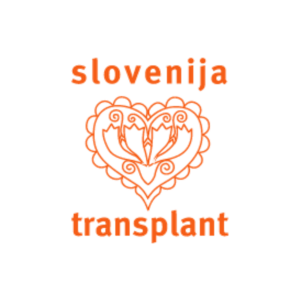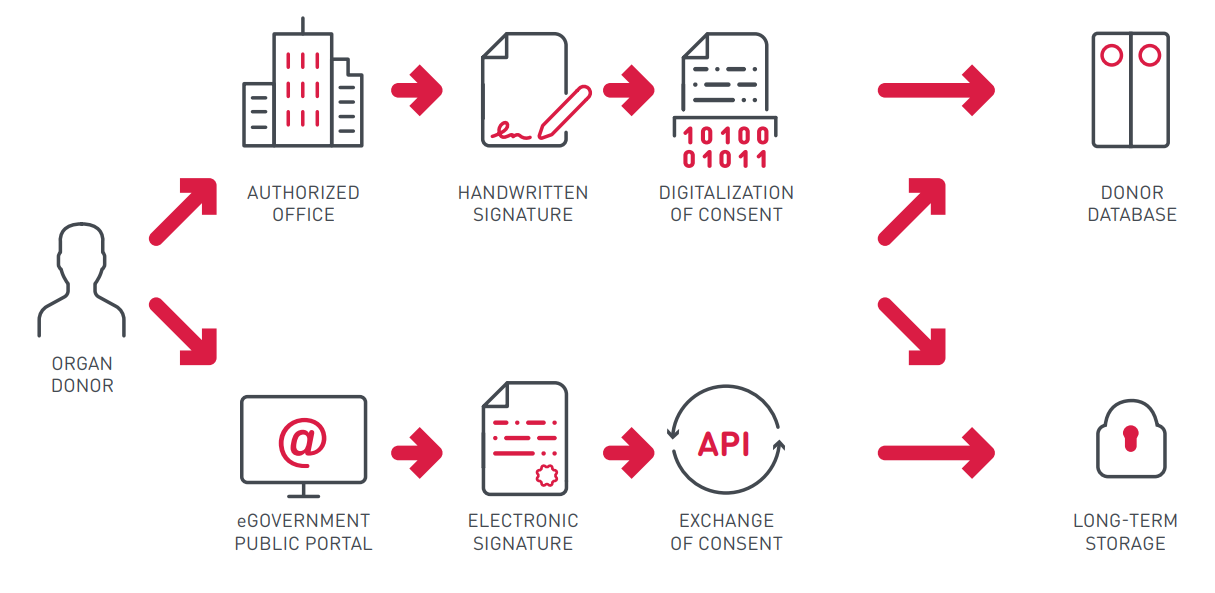
Case study // One click today can one day save lives
Why not simplify the procedure for completing an organ donor consent form if technology permits it and donors have often stated that the complex procedure is one of the main deterrents for submitting their consent? The number of donors has gone up by a quarter, and the procedure remains secure and compliant.

CustomerSlovenija-transplant
Organization size Small
Industry Healthcare
Solution InDoc EDGE platform
Slovenia Transplant (Institute for Transplantation of Organs and Tissues of the Republic of Slovenia) connects, coordinates, promotes and monitors organ transplant donations and procedures in Slovenia. It is the central liaison institution and the central coordinating office of the national transplant network, which operates under the auspices of the Ministry of Health. Since 2000, Slovenia Transplant has been part of the Eurotransplant network.
It operates based on the principles of self-sufficiency, patient equality, optimal efficiency, medical ethics and deontology, professionalism, non-commercialism, transparency, and voluntariness, as well as in accordance with the applicable law. Slovenia Transplant also works intensively to inform the general public about the importance of organ donation as the ultimate way of helping others, thus encouraging people to decide to donate organs.
Organ donation means extending our responsibility beyond the traditional concept of helping our fellow human beings. It is one of the most ethical forms of individual responsibility to others. Therefore, beyond simply informing the general public, a simple and user-friendly procedure for consenting to organ donation is crucial. Complex bureaucratic procedures can discourage even an informed individual from giving consent. Therefore, we wanted to simplify the process and also allow for consent to organ donation to be submitted electronically.
– Danica Avsec, MD, Director of Slovenia - transplant
CHALLENGE
Increase the number of donors and simplify the consent process
Organ transplantation represents a highly successful treatment for organ failure when all other treatment approaches have been exhausted. Though over 100 organ transplants are performed a year in Slovenia, there are twice as many patients waiting for a transplant. This shows Slovenia Transplant faces a great challenge in terms of the disproportionate number of patients who need transplants as compared to the number of available organs
The insufficient number of donors is a result of the following factors:
- Lack of awareness among potential donors.
- Complex bureaucratic procedures for consenting to organ donation. Potential donors could only submit consent to organ donation in paper form at select designated locations in Slovenia.
- The inconvenient working hours of these authorized offices discouraged many people from consenting to organ donation.
IN SLOVENIA, THERE ARE TWICE AS MANY PATIENTS WAITING FOR TRANSPLANTS AS THERE ARE AVAILABLE ORGANS.
Zaradi navedenih težav so si v Slovenija - transplantu prizadevali za poenostavitev postopka za opredelitev darovanja organov. Želeli so omogočiti enostavno elektronsko oddajo soglasja preko spletnega mesta eUprava, kjer bi lahko posameznik hitro izpolnil obrazec, ga elektronsko podpisal, tak obrazec pa bi nato zakonsko skladno dolgoročno hranili. Obrazce, ki bi bili tudi v prihodnje pridobljeni po klasični, papirni poti, pa bi ustrezno skenirali, pretvorili v elektronsko obliko in dodali v enotno dolgoročno hrambo.
Due to these problems, Slovenia Transplant’s made efforts to simplify the procedure for identifying organ donors. They’ve wanted to make it easy to submit consent electronically via the eGovernment public portal, where individuals could quickly fill out a form and sign it electronically, while Slovenia Transplant would then preserve the form in accordance with the regulations. Consents still in paper form would be properly scanned, converted into electronic form, and added to a single secure and compliant long-term e-archive. As the forms contain sensitive personal information, it would be necessary to restrict access to authorized users and to ensure that all access was fully traceable. When the retention period expired (100 years after the birth or 10 years after the death of a donor), the documents would be removed from the e-archive.
SOLUTION
From document capture to long-term storage with InDoc EDGE
Our InDoc EDGE has effectively met Slovenia Transplant’s requirements regarding the capture and long-term storage of organ donation consent forms.
InDoc EDGE enables complete document management and provides for certified, legally compliant e-archive. As organ donation consent forms contain sensitive personal information, it’s been particularly important to ensure legal compliance with regard to personal data protection. By default, InDoc EDGE already complies with personal data protection legislation, including the GDPR.
THE LEGAL RETENTION PERIOD FOR ORGAN DONATION CONSENT FORMS IS 100 YEARS AFTER THE BIRTH OR 10 YEARS AFTER THE DEATH OF A DONOR.
#1 Scanning paper forms and transferring the data directly to InDoc EDGE
In order to scan organ donation consents in paper form, we’ve set up a single dedicated consent form scanner at the Slovenia Transplant offices. Using the installed Kofax Express Desktop application, the scanner transfers data directly to InDoc EDGE.
#2 Accepting electronic forms from the eGovernment public portal
Once an individual electronically signs and submits the form via the eGovernment public portal, the InDoc EDGE automatically accepts the document for storage via a secure connection and supplements the donor database with the necessary data. In this process, the data are anonymized, as ensuring the protection of sensitive personal data is vital.
#3 Long-term storage and removal after expiry of the retention period
TBoth paper forms submitted at an authorized office and electronic forms submitted via the eGovernment public portal are now stored in a certified InDoc EDGE long-term e-archive in accordance with the highest security standards. Of course, InDoc EDGE also provides for comprehensive monitoring of the stored documents. Forms that have expired, i.e. 100 years after the birth or 10 years after the death of a donor, are removed from the archive according to a predetermined rules.
SOLUTION DIAGRAM

At Slovenia Transplant, with the use of Mikrocop’s InDoc EDGE, we’ve successfully simplified the organ donation consent procedure and made it possible to submit consent electronically. The number of new organ donors has increased by 25 percent in 2018 as compared to 2017. In addition, we’ve improved productivity, as employees now spend less time working with paper forms. With electronic consent, we’ve made organ donation more accessible to individuals who may not have thought about it before due to the complexity of the process.
– Danica Avsec, MD, Director of Slovenia - transplant
EFFECT
The number of organ donors increased by 25 percent in one year
What results has Slovenia Transplant achieved by introducing electronic organ donation consent forms and by using InDoc EDGE?
By introducing a faster, digitalized organ donation consent process, Slovenia Transplant has successfully responded to two of the three factors which limited the number of donors - the process is no longer complicated, and consent forms no longer have to be submitted during the working hours of an authorized office. While constantly raising the Slovenian population‘s awareness of the importance of organ donation, the number of new organ donors has increased by 25 percent in 2018 as compared to 2017.
+25% MORE NEW ORGAN DONORS IN 2018 AS COMPARED TO 2017.
Since the procedure is completely automated, Slovenia Transplant has also saved time it would have spent processing paper forms. It is now easier to address other, more important tasks.
Let's not forget, one click today could save a life someday!
Want to know more? Schedule a presentation!